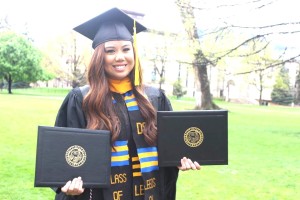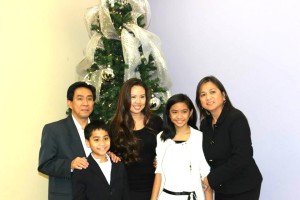Fil-Australian realizes American Dream
SAN FRANCISCO — Monica Ann C. Agsam, 22, is the youngest auditor for the multinational professional services giant Ernst and Young (EY) in New York. Her achievement fulfills her and her parents’ dream of success in America.
The Agsams are still Australian citizens except for the two younger children who were born in the US. They are permanent residents and will apply for US citizenship next year. Despite her upward career climb, Monica and her family have become fully aware of the social challenges that often face immigrants in the United States.
Monica earned her master’s degrees in business management and accounting at the University of Colorado at Boulder and passed the highly competitive CPA examination, which all happened this year. Monica started working at EY last year.
“My parents and I immigrated to the United States in the late 2000 because they wanted to fulfill their American Dream. My father, an engineer, moved to San Francisco ahead of us to work in IT in Silicon Valley,” Monica says.
Raising Monica
Despite being born in Australia and raised in the United States, Monica considers herself Filipino, although she admits she and her siblings do not speak Tagalog or Cebuano fluently because of the different languages used at home.
Agsam household is also a blend of Filipino cultures. Her father spoke Ilonggo, her mother Tagalog and her grandmother Cebuano.
“One of the ‘most Filipino’ characteristics that my siblings and I were instilled with is our awareness and concern for others,” she says.
“Regardless of if I am at home or if I am simply walking on the street, I am always conscious of the people that surround me and willing to lend a helping hand if I see someone in need, even when I don’t have much to give, which is something that my parents taught and showed me throughout my life,” she explains.
9/11 aftermath
September 11, 2001 was a most unforgettable day not only for the world, but also for the Agsam family. Monica was seven years old and the family had barely settled in the United States when the 9/11 attacks happened. As a result, her father who was barely a year working at Silicon Valley lost his job during the retrenchment. Since they were on employer-sponsored visas, the Agsam family didn’t know what was going to happen to them.
“We had no income, a ticking clock on our visas, and no place to stay. My family and I were lucky enough to stay with family and friends that we had around the United States. For about five years, we struggled tremendously,” Monica recalls.
After five years of working various part-time and odd jobs like painting houses, Monica’s father was able to find a full-time job in the IT department of a prestigious law firm in Denver, Colorado. They moved to Mile High City where the rest of the family members have stayed for the past 10 years.
Workplace battles
Monica’s father, being a dark-skinned Filipino, has had a constant uphill battle in the workplace, where he is often seen as a vulnerable target because of his foreign roots and immigrant status. Monica says that her father has always stood his ground against “workplace bullies” who attempt to take advantage of him. His example is what makes Monica tough and competitive, an advantage as she climbs the corporate ladder.
As a student at the University of Colorado, Boulder where the student population was mostly white and from upper-class backgrounds, Monica battled to make a name as an underrepresented minority and a person from a modest, middle-class family.
She has witnessed instances of discrimination against Filipinos and other people of color. She tells about her dark-complexioned Filipino friend in college who was often followed in a mall by security guards and wrongly accused of theft. Monica has also felt pressure to distance herself from her Filipino heritage to be accepted among her peers at school or in the work environment.
Though America is known as a melting pot, she believes immigrants, women and people of color still experience prejudice. It took her several years to realize that ethnicity, nationality and socio-economic class are not burdens but rather advantages, because of the different perspectives and values that arise from these backgrounds.
“As someone who fits into all three of those categories, I have always felt that there is an inevitable gap to overcome in order to pull myself up and prove myself as being just as capable, if not more capable, than my peers or co-workers who come from more ‘privileged’ backgrounds and are not people of color,” she explains.
Eye-opening experience
Visiting the Philippines recently was an eye-opening experience for Monica. She first visited the country when she was four years old. She says that the trip to her parents’ home country gave her a completely different level of respect and love for her family and relatives who are hardworking. Seeing the poverty in the Philippines has made her mull changing careers to work in an international relief or aid organization.
“It is easy to fall under the influence of the American culture in which you must compete and prove yourself among your American peers in order to fit into the false notion of ‘white America.’ Though it is inevitable that Filipino immigrants will eventually assimilate into the American society and traditions, you should not lose touch of your Filipino values and traditions,” Monica advises young Filipino Americans.
Monica says that living the American lifestyle as well as protecting and embracing one’s own culture are possible.
“I believe that our Filipino heritage is something to be truly proud of and as we continue to grow and succeed in life, we should always remember our roots and those that have supported us,” she adds.
















